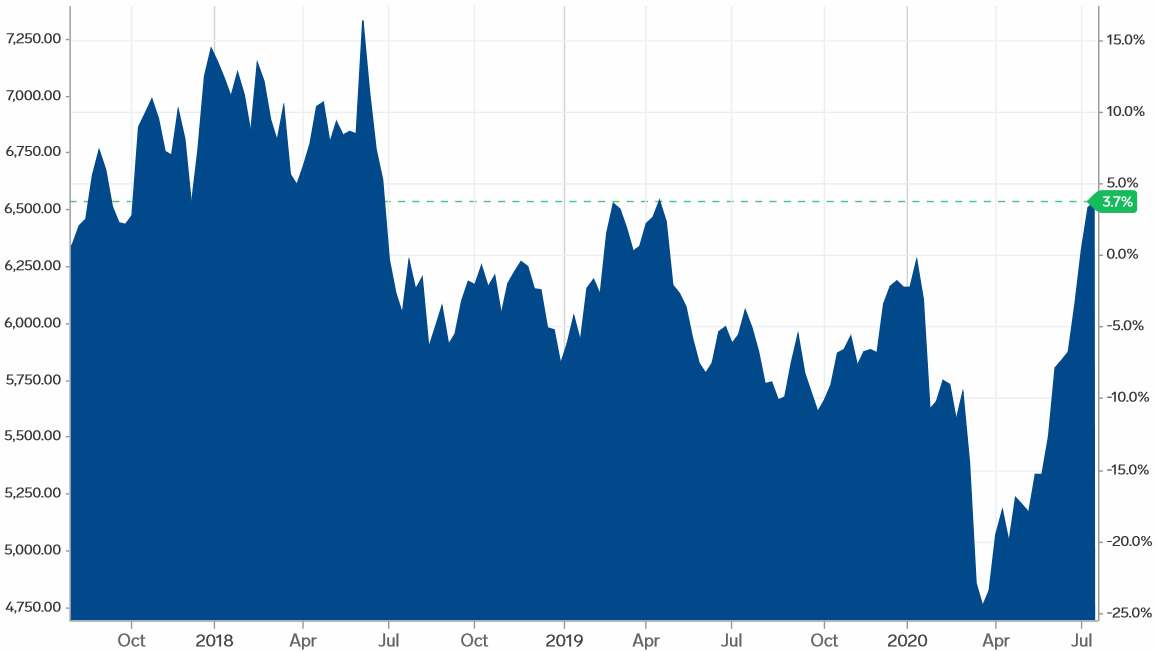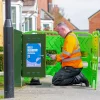Rising Copper Prices are a Double Edged Sword for UK Broadband

Last week the price per tonne of copper (Cu) bucked expectations by briefly reaching a new two year high of just over $6,500 (£5,074), which could act as a further incentive for UK telecoms operators to remove their old cables in favour of fibre optic (e.g. FTTP) infrastructure. If only it were so simple.
As one recent article in the Economist highlighted, the recent surge in the price of copper is unusual. Normally an economic downturn tends to result in a degree of often predictable choreography between gold and copper. On the one hand the price of gold will climb as investors seek a safe haven, while copper tends to dip due to a slowdown in manufacturing and construction.
The sharp economic shock caused by the COVID-19 pandemic did result in copper falling off a cliff, dropping from a peak of $6,300 in January to a low of just over $4,700 at the end of March 2020. But then something odd happened, despite lockdowns being introduced across much of the western world, the price of copper started climbing again and it has continued to do so.
Advertisement
In short, copper is suddenly behaving more like gold, although it’s still a long way from the last major peak in 2018 when it was worth over $7,300 per tonne (here).
Copper Price (Market Summary Over 3 Years)

All of this could be seen as representing good news for operators like KCOM and Openreach (BT), which are already beginning the long process of moving consumers from copper to Fibre-to-the-Premises (FTTP) based broadband (example). However, physical removal of existing copper would be the final step in that process and is thus still quite a long way down the road (i.e. after everybody within an exchange area has been migrated to fibre).
Advertisement
The reality of Openreach’s move to retire, and then remove copper from their ducts, is that it will be gradual (taking many years to complete), following a pre-set plan as agreed with Ofcom. In other words, the annual movement(s) in the market value of copper itself is, today, perhaps less relevant to the operator than the desire to ensure a smooth and orderly platform transition to “full fibre” infrastructure.
Nevertheless, the value of that shiny red-orange metal is still an important consideration as it could help to cover some of the £12bn cost estimated for deploying full fibre infrastructure. Crucially there is a cost attached to the removal of copper itself and not all of their cables may be economically viable for extraction (they’re more likely to focus on the big core bundles of copper).
One estimate that we saw from Investec a few years ago suggested that BT’s copper (i.e. the bits that may actually be viable for removal), when adopting a price of around £5,000 per tonne, could be worth between £2.5bn to £5bn. As usual there are plenty of unknowns here, so take such figures with a pinch of salt.
The other caveat in the rising price of copper is that it will no doubt embolden Metal Theft against the operator’s network, which tends to cause untold misery (i.e. lengthy service outages) for homes and businesses in areas affected by such activity (i.e. Openreach’s copper being brutally ripped up out of the ground and sold to dodgy scrap merchants).
Advertisement
At this point some people often remark that Metal Theft is a good advert for advancing the deployment of optical fibre cables as a replacement (i.e. optical fibre is worth nothing to thieves), which is true except for one rather big caveat. Criminals often can’t identify whether or not a cable is copper or fibre, until after the damage has been caused.
Mark is a professional technology writer, IT consultant and computer engineer from Dorset (England), he also founded ISPreview in 1999 and enjoys analysing the latest telecoms and broadband developments. Find me on X (Twitter), Mastodon, Facebook, BlueSky, Threads.net and Linkedin.
« Digital Scotland Lauds Fibre Broadband for 950K Extra Premises
Tesco Mobile UK Bundles Six Months of Clubcard Plus Access »






















































In a hundred years time the notion of burying any type of cable in the ground to provide data will seem as ludicrous as having to stand in a cupboard painted red with windows in it in a public place to be able to make a telephone call is now.
I suppose as 20G isn’t out yet lets get digging. Seems like a lot of effort for what will become redundant due to some form of radio in the future though.
You’re assuming, I guess, that somebody will find a way around the laws of physics for radio spectrum? Because simply using ever higher frequency radio waves to boost data speeds only makes deploying comparable coverage with such infrastructure many times more expensive, which is partly why UK mobile operators aren’t all rushing to harness 23GHz or higher (would help if Ofcom got their auction ducks in a row too).
You’re right, why did they bother cabling the country with copper all those years ago.
We should have just waited decades for 2G/3G/4G.
In fact we shouldn’t have built those mobile masts either as something will come along and make them redundant at some point.
Using technology that will be superseded 1 day is such a waste.
We should all live like cavemen until some ground breaking, more efficient technology comes along.
Thank you Captain Hindsight, what would we do without you!
Cool. How does data get from the masts to the wider Internet or indeed hit extremely high speeds without everything having line of sight?
If I where to have a pound for every time someone one ignorant of the laws of physics claimed that fixed line broadband will be made obsolete due to some future wireless tech (usually 5G, sometimes SpaceX type satellite broadband) I would be a multi millionaire by now.
In short gigabit capable broadband via wireless would require masts on practically every streetlamp and this is governed by laws of physics that are they are wrong then any known current wireless connectivity would not work (aka they are not wrong). At that point from a capital and operational expenditure perspective it is cheaper to run fibre into everyone’s home.
Single mode fibre is the end game for connectivity. Single mode fibre you put in 30 years ago for 10Mbps connectivity is still good for at least 1Tbps. It will never get any better. Excepting if they ever work out hollow core fibre, you will get very slightly reduced latency, we are talking sub 1ms which unless you are a bottom feeding high-frequency trader is irrelevant. It will however not lead to higher speeds.
You can argue IAB (Integrated Access and Backhaul) all you like, but the radio will need fibre at some points. Today we see fibres delivering 800Gps in both directions, which is light years away from being delivered by Radio.
And by the time RF can do that, fibre will do 100Tbps.
Plus people only attack cables in the ground for money. People attack radio sites because a footballer who thinks that ABdPJ is secretly a giant reptile doesn’t understand physics. Not to be underestimated!
May as well get on with digging up the undersea cables now then?
Perhaps they should start using fibre rather than the crappy copper
If they need to start using fibre that’s some interesting cable I have coming into my home. Didn’t know copper could come with APC connectors.
There is always going to be an issue with copper as it is very attractive to criminals and as the article outlines, replacing it with fibre may not remove the problems of network outages. The cable can’t be left in the ground or it will attract criminals, but when it is removed it opens up a whole new opportunity for theft. Thefts committed by contractors, staff and those involved in the disposal process are significant and are very often overlooked. We have discovered significant thefts by scrap metal dealers when it comes to weights, contamination and a multitude of other scams including just failing to record transactions. A lack of control when it comes to asset disposal makes prosecution extremely difficult and is addition opens up disposal.